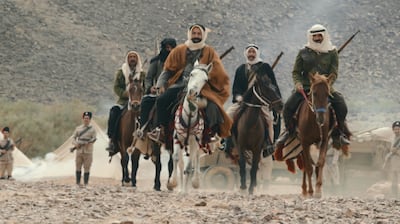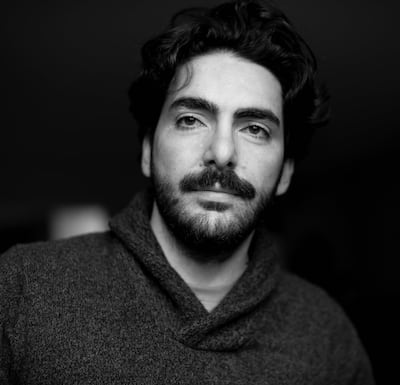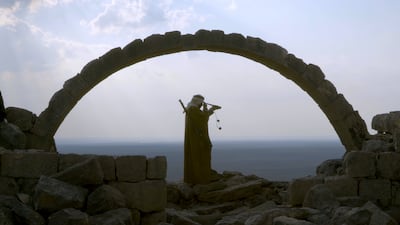Making a short film on a historical subject as sprawling as the Great Syrian Revolt seems like a bold venture, but Faisal Attrache says it was all a matter of finding a potent focal point.
Set in Transjordan in 1927, From the Mountain follows Syrian Druze leader Sultan Pasha Al-Atrash as he tries to sustain the fight against the French in exile. With his family’s well-being under threat, the famed commander of the revolution must decide how much he is willing to sacrifice for his nation’s independence.
It took years and more than one attempt for Attrache to decide on the best way to frame From the Mountain, which screened as part of the short film competition at the Red Sea International Film Festival earlier this month.

The project first began as a crowdfunding campaign in 2015. As a direct descendant of Al-Atrash, the American-Syrian filmmaker wanted to bring his great grandfather’s story to the big screen in a way that showed the human aspect of the larger-than-life figure.
“He’s my father’s grandfather,” Attrache says. “He was his hero but at the same time, he was grandpa. This is why the focus of the film is also family. If someone else made it, Sultan would’ve been presented as a stereotype of the Arab hero, and that’s why I have been fighting to make this because I have a perspective that can humanise him.”
In his initial attempt, Attrache pinpointed a moment in 1922 to tell the story of his great grandfather and the revolution he led. That moment is known as the Adham Khanjar incident and marked a boiling point in the already-seething relations between Syrians and the French colonialists.
A Lebanese revolutionist who participated in an assassination attempt of Henri Gouraud, the French high commissioner in Syria and Lebanon, Khanjar sought refuge from the French with the Al-Atrash family in the Jabal al-Druze area.
“They arrested him as he was going to Sultan’s house,” Attrache says. “This was a line for Sultan. He had never met Khanjar but since he was his guest, the arrest broke the codes of hospitality.”
The event, Attrache says, was “the straw that broke the camel’s back” and spurred what became known as the First Revolution – a precursor to a series of uprisings against the French.
Attrache wanted to depict the intensity of this moment, as well as its consequences, in a short film, which would have been his proof of concept for a larger feature.

“We went into production in 2016 on this project,” Attrache says. “We had raised the money through the crowdfunding campaign. Unfortunately, it was a very difficult endeavour, and we went over budget and didn’t shoot the whole script. It was a dark time. I tried to raise money to finish it, but I was not happy with what we shot.”
So Attrache hit the brakes on the production, took a step back and rethought his film from scratch. “I regrouped and had to write a new script, because funding was in place but was not enough [for the Adham Khanjar story],” he says. “So I kind of worked backwards.”
That’s when Attrache chose to look at the Great Syrian Revolt from another angle. Instead of looking at its instigating factors, Attrache instead set his sights on the tail-end of the 1925 rebellion – when more than 1,500 revolutionaries, outmanned, outgunned and with their supplies bottlenecked by the British, chose not to give up to the terms of the colonial forces and to instead fall back to Saudi Arabia to bide their time.
“The Great Syrian Revolt was not just from 1925 to 1927,” Attrache says. “It was 1925 to 1927 in the action of it. But from 1927 to 1937, Sultan and the revolutionaries were exiled and in his point of view they were still fighting the war, still fighting the revolution.”
Attrache’s film sets the focus at the point in time when his great grandfather had to make an important decision: to either take the amnesty offered by the British and call an end to the revolution against the French or go farther into exile and persevere.
“In a way, you can consider this the fork in the road,” he says. “Do we go back [to Jabal al-Druze] and give up our weapons? Half the people with them took the amnesty and returned to their homes, but 1,500 chose to keep going and these were the ones who literally carried the revolution, who decided to keep going, so symbolically they were the continuation of the revolution.”
Al-Atrash wouldn’t return to Syria until 1937. After being granted amnesty, he returned to a homeland still overrun by colonial forces. However, the fires of the movement against the French had been fanned, and by 1946, Syria would gain its independence.
“So it’s this weird thing where he loses, he loses and loses, but in a way, he wins,” Attrache says. “In the end, he did come back to his land, the French are still there but a whole movement against them has been created and their days are numbered.”
Attrache says he is looking to make an anthology of works related to his father’s story. He is still keen on bringing the Adham Khanjar incident to the screen, but as a feature.
“That would cover everything leading up to [Al-Atrash’s] exile [into Transjordan],” he says. Attrache says that he then intends to do a series based on the Great Syrian Revolt of 1925.
“The revolt is not just about Sultan, but other big characters in Syrian history,” Attrache says. “It’s about people coming together to try and kick out the French. It’s a much bigger mosaic of stories. I want to make that into a series."


